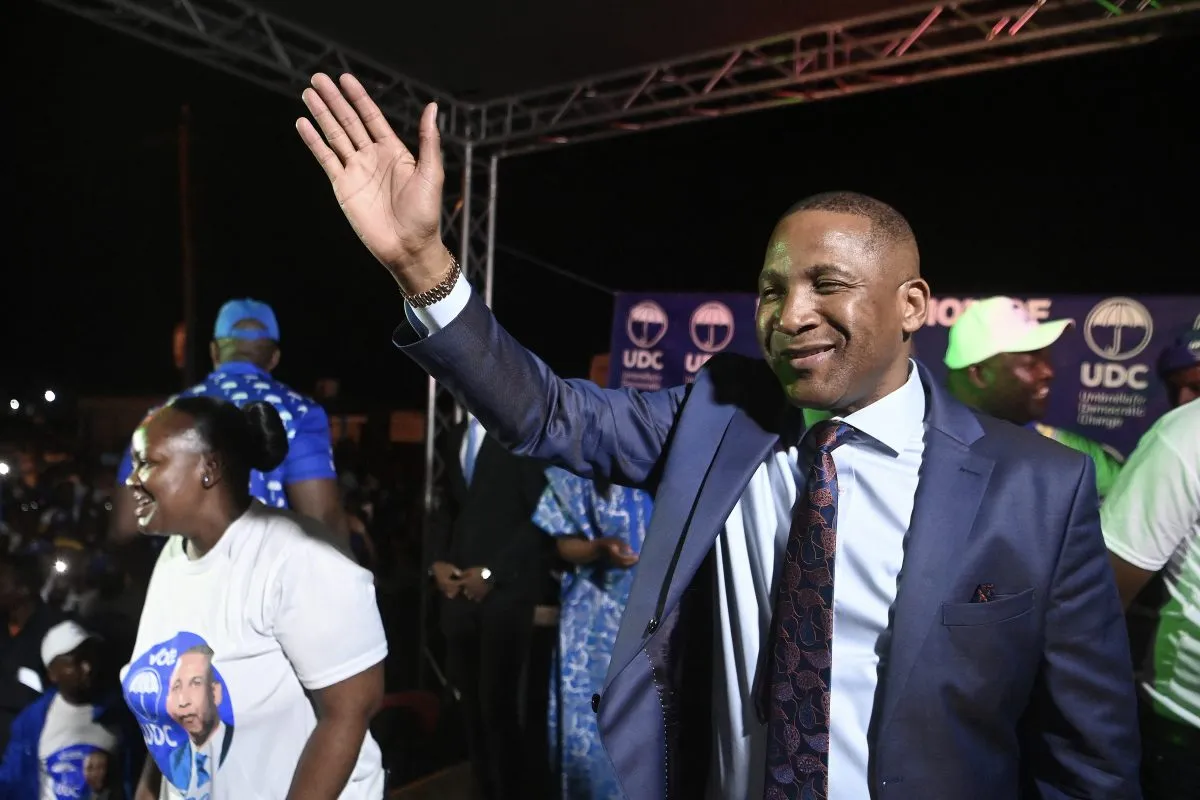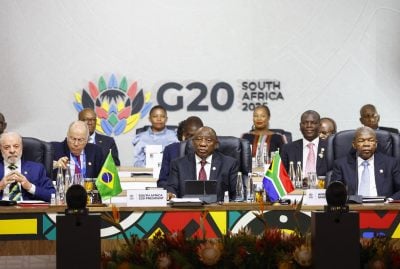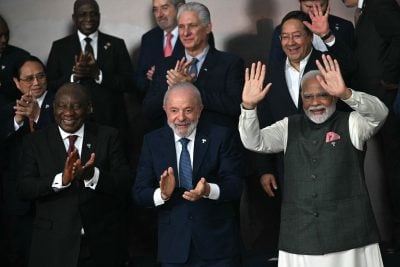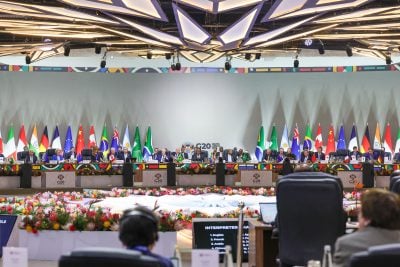In a political earthquake that almost no-one saw coming, the Botswana Democratic Party (BDP), in power since 1966, was consigned to a decisive defeat in October’s general election. The former ruling party has been left with just four out of 61 seats in parliament.
Outgoing President Mokgweetsi Masisi immediately accepted the result and handed power to opposition leader Duma Boko, a former lawyer, on 1 November.
Boko’s Umbrella for Democratic Change (UDC) took 36 seats (and, as the leading party, is entitled to appoint a further six MPs), while the Botswana Congress Party (BCP) won 15. The Botswana Patriotic Front, backed by former President Ian Khama, equalled the BDP by winning four seats.
Botswana has long been regarded as among the most democratic countries in Africa; the seamless transition will further enhance these credentials. Nevertheless, the dramatic shift in Botswana’s politics has stunned observers accustomed to the country’s political landscape being defined by continuity.
“It’s safe to say we’re as surprised as everybody else,” says Louw Nel, senior political analyst at consulting firm Oxford Economics Africa. He notes that opposition parties cooperated in many constituencies to avoid splitting the anti-BDP vote. The BDP won 30.5% of the popular vote – less than 7% behind the UDC and almost 10% ahead of the BCP. But it found itself squeezed into second place in dozens of seats under the country’s first-past-the-post parliamentary system.
Dissecting defeat
The BDP’s collapse was arguably the biggest electoral upset in Africa since former Gambian dictator Yahya Jammeh was voted out in 2016. With hindsight, however, the warning signs have been flashing for the BDP for some time.
As reported by African Business in September, the country’s record in generating wealth from its diamond industry has not been matched by success in creating jobs. Unemployment has hovered at around 25% for many years, with youth unemployment at times exceeding 35%.
The IMF recently warned that Botswana’s economy is heading for a “severe slowdown” amid weaker global demand for diamonds.
“The UDC campaigned heavily on jobs and the country’s unemployment crisis was one of the main reasons the BDP was punished at the polls,” says Nel. “The UDC is more social democratic than the BDP and promises of labour market reforms appealed to voters.”
Nel adds that the BDP’s mixed record in stimulating value-added industries around diamond mining was a key factor for its defeat. “The BDP long vowed to create jobs in the diamond beneficiation sphere but failed to relocate diamond cutting and polishing jobs to Gaborone, as promised.”
Mining top of the in-tray
Given that jobs dominated the election campaign, the issue will be top of the agenda for the new government.
Boko has recognised the importance of existing jobs in the mining industry, stating in a speech shortly after his inauguration that he would seek to “safeguard the goose that lays the golden egg”, and promising to conclude a sales pact with Anglo American-owned diamond mining giant De Beers.
Botswana and De Beers each own half of joint venture Debswana, the world’s leading diamond producer by value, and Botswana holds a 15% stake in De Beers.
Masisi, by contrast, adopted a more aggressive approach in negotiations with De Beers during his time in power. Although this resulted in more favourable contractual terms for the state, some voters feared that Masisi’s tactics were to blame for reduced diamond sales and threatened the future of the industry in Botswana.
“Time will tell if a UDC-led government can do better in convincing De Beers, Lucara [a Canadian miner] and other multinationals to invest in localisation,” says Nel. Risk consultant Marisa Lourenço adds that providing clarity around relations with mining giants will need to be a “first step” for Boko. “The new terms that former president Masisi hashed out in mid-2023 marked a new way of the government’s engagement with De Beers, but the terms are still to be finalised,” she says. “I don’t think President Boko will stray too far from what his predecessor negotiated, but he may to extend a friendlier hand to the miner, and provide reassurance that his administration isn’t look to play hardball anymore.”
Lourenço also notes there is confusion over whether the state-owned Okavango Diamond Company has been able to conclude a deal with Belgian-based diamond processor trader HB Antwerp on selling a percentage of its output. The reported agreement, first announced in March, would see the government of Botswana take a 24% stake in HB Antwerp. Lourenço says the details are “very murky” and warns that the failure to clarify if the deal has been concluded is fuelling uncertainty.
Driving for diversification
Boko is not expected to bring vast ideological changes in how the government is run.
“The UDC did not campaign on populist initiatives like nationalisation or expropriation,” notes Nel. While the UDC has promised to raise the minimum wage, Nel adds that “the incoming government will be well-aware of Botswana’s reputation as being business friendly and will not want to risk capital flight by doing too much too quickly.”
“The UDC will recognise the risk of moving too fast but will also know that it has been given a strong mandate by voters who will expect to see the party make good on its election promises.”
The UDC will have its work cut out to fulfil its promises to create 450,000-500,000 jobs over the next five years (an exceptionally ambitious pledge, given that only around 750,000 adults have jobs at present). If the party is to stand any chance of success, it will have to go beyond the mining sector and make real progress in diversifying the economy.
As a result, Nel says that the tourism industry is likely to be a major focus. He reports that the UDC will look to move away from “the high-value-low-volume model the country is famous for, but which excludes a lot of communities.”
Botswana currently attracts around 1m tourists each year, and the sector accounts for around 10% of GDP, yet high-end safari tourism has grown increasingly controversial in recent years amid pressures to develop other industries and concerns over the impact of human-wildlife conflict.
Lourenço points to agriculture, e-services and renewable energy as having potential for growth, but suggests that Boko will need to reform the business environment.
She says that foreign companies often complain about expectations to take on local shareholders. “A lot of time local shareholders are politically connected, which raises concerns around conflict of interest.”
Protests over corruption broke out in Gaborone days after Boko took office, prompting the new president to order an audit of state institutions.
Meanwhile, Lourenço warns that the new government will need to tackle structural factors in order to boost diversification – and could find that its political honeymoon is short-lived if it fails to deliver. She says that recent blackouts linked to water shortages affecting coal-fired power stations “weigh on the attractiveness of Botswana as an investment destination”.
“Limited power and water mean higher operating costs for any industry, which can inhibit wider growth,” says Lourenço. “The rising urban population will also bring with it a greater expectation of the state to provide jobs in the cities, which in time, could result in popular dissatisfaction if this expectation is not met.”
Want to continue reading? Subscribe today.
You've read all your free articles for this month! Subscribe now to enjoy full access to our content.
Digital Monthly
£8.00 / month
Receive full unlimited access to our articles, opinions, podcasts and more.
Digital Yearly
£70.00 / year
Our best value offer - save £26 and gain access to all of our digital content for an entire year!

 Sign in with Google
Sign in with Google 



